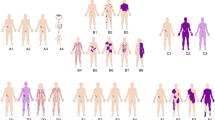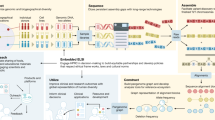Abstract
This note records the events which led up to the foundation of the European Society of Human Genetics on March 15, 1967.
Similar content being viewed by others
The European Society of Human Genetics was founded on March 15, 1967, as recorded on page 4 of volume 1 of the Bulletin of the Society:
Reprint of Announcement of March 15, 1967 (sent to medical and some other journals):
‘The European Society of Human Genetics’, initiated during the IIIrd International Congress of Human Genetics in Chicago, 1966, is now established.
The aims of the Society are to promote research in human genetics including basic genetics and genetic pathology, and for this purpose to create and maintain personal contacts between human geneticists in Europe.
The Society gives initiative and support to arrangement of at least one symposium a year, to cover a limited topic and to be given usually by a small group of invited speakers; in addition there may be special study groups. The first symposium will possibly be in October-November, 1967, as a long week-end arrangement, and will, like the organization of the Society in general, be given a very simple form. Further information about the character of the Society may be obtained from any of the persons listed below, who constitute the responsible board.
A ‘Bulletin of the European Society of Human Genetics’ will later keep the members informed.
Membership is open and may be attained upon application and payment of the annual membership fee $ 6 to the: European Society of Human Genetics, H.C. Andersens Boulevard 2, Copenhagen V, Denmark. Application forms may be obtained upon request from this address or from any board member.
-
Professor G. Anders, Groningen (The Netherlands).
-
Dr. L. Beckman, Uppsala (Sweden), (Vice-Chairman 1967).
-
Professor K. Berg, Oslo (Norway).
-
Professor R. Ceppellini, Torino (Italy).
-
Dr. A. de la Chapelle, Helsinki (Finland).
-
Dr. Z. Dolinar, Ljubljana (Yugoslavia).
-
Dr. P. Fessas, Athens (Greece).
-
Dr. C. Ford, Harwell (Great Britain).
-
Professor J.E. François, Gent (Belgium).
-
Dr. J. de Grouchy, Paris (France).
-
Dr. O. Jensson, Reykjavik (Iceland).
-
Professor D. Klein, Geneva (Switzerland).
-
Professor J. Mohr, Copenhagen (Denmark), (Chairman 1967).
-
Professor V. Myslivec, Prague (Czechoslovakia).
-
Dr. A.A. Prokofjeva-Belgovskaya, Moscow (U.S.S.R.). (const.).
-
Dr. A. Szeinberg, Tel-Hashomer (Israel).
-
Professor F. Vogel, Heidelberg (Germany).
-
Professor I. Wald, Warschawa (Poland).
-
Professor M. Weninger, Vienna (Austria).
It will be seen that the founding Chairman was Professor J. Mohr and the founding Vice-Chairman, Professor L. Beckman. These two were joined by H.W. Goedde to form the Organizing Committee for the first symposium, held in Copenhagen on November 18 and 19, 1967. The invited lectures were on the subject ‘Genetic Polymorphism in Man’, and there was also a session for contributed papers.
The decision which led to the establishment of the Society was taken at an informal meeting of European participants at the 3rd International Congress of Human Genetics in Chicago in September 1966. The meeting was called by one of us (JHR) as a result of a conversation during the workshop ‘The Use of Computers in Human Genetics’ held at Ann Arbor at the end of August. In the course of a country walk near Ann Arbor, we discussed the fact that European human geneticists seemed most often to meet each other in the United States, and that a European Society might enable them to meet each other more easily in Europe. We resolved to air the suggestion at the forthcoming Chicago Congress.
As European participants to the Congress will remember, a notice was put up inviting everyone from European countries to attend a meeting chaired by Prof. R.L. Kirk, at that time employed by the WHO in Geneva. In the notice, Europe was defined as including any state that had territory within 1,000 miles of Geneva. Since this seemed to exclude countries such as Israel, Egypt, Iceland and Finland, all participants from these countries were specifically invited as belonging to the European academic community. A committee was elected with the remit of considering whether a European Society of Human Genetics should be established. It met in Copenhagen on January 21, 1967, and decided in favour, announcing its decision in the notice reprinted above.
The original committee, with four additional co-opted members from countries not represented at the Chicago meeting, constituted itself into the initial Board. At that time, iron-curtain countries would probably have nominated scientists chosen for communist loyalty rather than for any other merit, so the committee chose to co-opt delegates from those countries rather than tolerate the nomination by national authorities of political appointees. It was to stabilise these choices against political intervention that renomination or re-election was ruled out. In an attempt to be non-discriminatory, this was applied to all countries! Surprisingly, this unorthodox system worked well.
Author information
Authors and Affiliations
Additional information
Renwick died on September 29, 1994.
Rights and permissions
About this article
Cite this article
Renwick, J.H., Edwards, A.W.F. The Foundation of the European Society of Human Genetics. Eur J Hum Genet 3, 63–64 (1995). https://doi.org/10.1159/000472278
Issue Date:
DOI: https://doi.org/10.1159/000472278
Key Words
This article is cited by
-
The European Society of Human Genetics: beginnings, early history and development over its first 25 years
European Journal of Human Genetics (2017)



